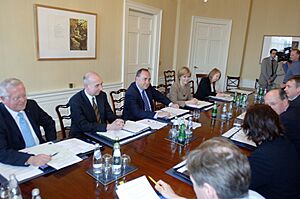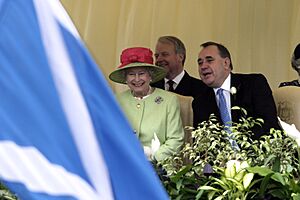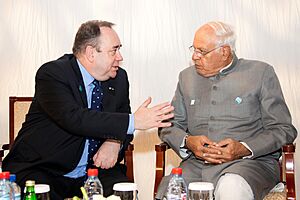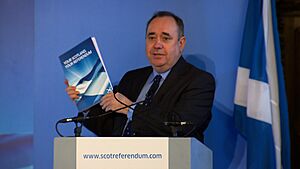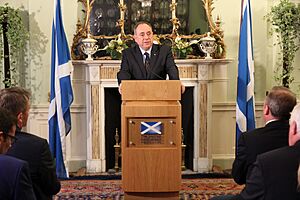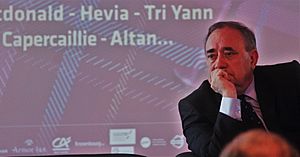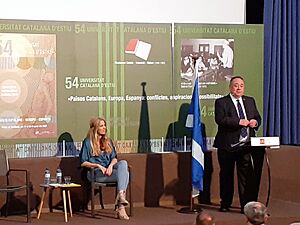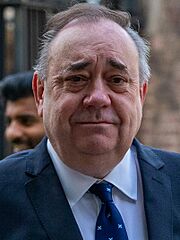Alex Salmond facts for kids
Quick facts for kids
Alex Salmond
|
|||||||||||||||||||||||||||||||||||||
|---|---|---|---|---|---|---|---|---|---|---|---|---|---|---|---|---|---|---|---|---|---|---|---|---|---|---|---|---|---|---|---|---|---|---|---|---|---|
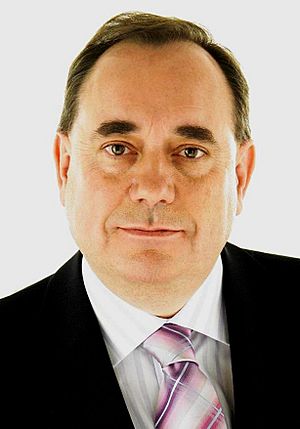
Official portrait, 2007
|
|||||||||||||||||||||||||||||||||||||
| First Minister of Scotland | |||||||||||||||||||||||||||||||||||||
| In office 17 May 2007 – 18 November 2014 |
|||||||||||||||||||||||||||||||||||||
| Monarch | Elizabeth II | ||||||||||||||||||||||||||||||||||||
| Deputy | Nicola Sturgeon | ||||||||||||||||||||||||||||||||||||
| Preceded by | Jack McConnell | ||||||||||||||||||||||||||||||||||||
| Succeeded by | Nicola Sturgeon | ||||||||||||||||||||||||||||||||||||
| Leader of the Alba Party | |||||||||||||||||||||||||||||||||||||
| In office 26 March 2021 – 12 October 2024 |
|||||||||||||||||||||||||||||||||||||
| Deputy | Kenny MacAskill | ||||||||||||||||||||||||||||||||||||
| UK Parliament Leader | Neale Hanvey | ||||||||||||||||||||||||||||||||||||
| Preceded by | Laurie Flynn | ||||||||||||||||||||||||||||||||||||
| Leader of the Scottish National Party | |||||||||||||||||||||||||||||||||||||
| In office 3 September 2004 – 14 November 2014 |
|||||||||||||||||||||||||||||||||||||
| Deputy | Nicola Sturgeon | ||||||||||||||||||||||||||||||||||||
| Preceded by | John Swinney | ||||||||||||||||||||||||||||||||||||
| Succeeded by | Nicola Sturgeon | ||||||||||||||||||||||||||||||||||||
| In office 22 September 1990 – 26 September 2000 |
|||||||||||||||||||||||||||||||||||||
| Deputy | Alasdair Morgan Jim Sillars Allan Macartney John Swinney |
||||||||||||||||||||||||||||||||||||
| Preceded by | Gordon Wilson | ||||||||||||||||||||||||||||||||||||
| Succeeded by | John Swinney | ||||||||||||||||||||||||||||||||||||
| Deputy Leader of the Scottish National Party | |||||||||||||||||||||||||||||||||||||
| In office 26 September 1987 – 22 September 1990 |
|||||||||||||||||||||||||||||||||||||
| Leader | Gordon Wilson | ||||||||||||||||||||||||||||||||||||
| Preceded by | Margaret Ewing | ||||||||||||||||||||||||||||||||||||
| Succeeded by | Alasdair Morgan | ||||||||||||||||||||||||||||||||||||
|
|||||||||||||||||||||||||||||||||||||
| Personal details | |||||||||||||||||||||||||||||||||||||
| Born |
Alexander Elliot Anderson Salmond
31 December 1954 Linlithgow, Scotland |
||||||||||||||||||||||||||||||||||||
| Died | 12 October 2024 (aged 69) North Macedonia |
||||||||||||||||||||||||||||||||||||
| Political party | Alba Party (2021–2024) | ||||||||||||||||||||||||||||||||||||
| Other political affiliations |
|
||||||||||||||||||||||||||||||||||||
| Spouse |
Moira McGlashan
(m. 1981) |
||||||||||||||||||||||||||||||||||||
| Education | Edinburgh College of Commerce University of St Andrews |
||||||||||||||||||||||||||||||||||||
| Cabinet |
|
||||||||||||||||||||||||||||||||||||
| Signature | |||||||||||||||||||||||||||||||||||||
Alexander Elliot Anderson Salmond ( SAM-ənd; 31 December 1954 – 12 October 2024) was a Scottish politician and economist. He was the First Minister of Scotland from 2007 to 2014. He was a key figure in the Scottish nationalist movement. Salmond led the Alba Party from 2021 until his death in 2024. He also led the Scottish National Party (SNP) twice, from 1990 to 2000 and again from 2004 to 2014. Before that, he was the party's deputy leader from 1987 to 1990.
Salmond studied at the University of St Andrews. He worked as an economist for the Scottish Office and the Royal Bank of Scotland. In 1987, he was elected to the British House of Commons. He served as a Member of Parliament (MP) for Banff and Buchan until 2010. In 1990, he became the leader of the SNP.
He led the SNP in the first Scottish Parliament election in 1999. The SNP became the second-largest party, and Salmond was the Leader of the Opposition. He was elected as a Member of the Scottish Parliament (MSP) for Banff and Buchan. He stepped down as SNP leader in 2000 and as an MSP in 2001. He then led the SNP group in the UK Parliament.
Salmond was re-elected as SNP leader in 2004, working with Nicola Sturgeon. He returned to the Scottish Parliament in 2007, representing Gordon (later Aberdeenshire East). In the 2007 Scottish Parliament election, the SNP won the most seats. With support from the Scottish Greens, Salmond became First Minister.
He led an SNP minority government in his first term. His government removed university tuition fees and prescription charges. They also focused on renewable energy. Salmond was the first nationalist First Minister. He tried to hold a referendum on Scottish independence, but did not have enough support at first. In the 2011 Scottish Parliament election, the SNP won a majority of seats. This was a big achievement for the party. Salmond used this win to hold the 2014 independence referendum. The Yes Scotland campaign lost the vote. After this, Salmond resigned and Nicola Sturgeon became First Minister.
Salmond returned to the UK Parliament in 2015 as MP for Gordon. He was the SNP's spokesperson for International Affairs and Europe. He lost his seat in the 2017 United Kingdom general election. In 2018, Salmond left the SNP. In 2021, he criticised the government's handling of certain investigations. Later that year, he became the leader of a new pro-independence party, the Alba Party. The Alba Party did not win any seats in the 2021 Scottish Parliament election or the 2022 Scottish local elections.
Contents
Alex Salmond's Early Life and Education
Alexander Elliot Anderson Salmond was born in Linlithgow, Scotland, on 31 December 1954. He was the second of four children. His parents, Robert and Mary Salmond, were both civil servants. Robert Salmond had served in the Royal Navy during the Second World War. The Salmond family had lived in Linlithgow since the mid-1700s.
Salmond's middle names came from a family tradition. They named children after the local Church of Scotland minister. He remained a member of the Church of Scotland throughout his life.
From a young age, Salmond suffered from severe asthma. His parents were supportive. Even though money was sometimes tight, they stressed the importance of education.
Salmond went to Linlithgow Primary School and then Linlithgow Academy. From 1972 to 1973, he studied at Edinburgh College of Commerce. He earned an HNC in Business Studies. He then went to the University of St Andrews. There, he studied Economics and Medieval History. He lived in Andrew Melville Hall. In 1977, he was elected vice-president of the students' council. He graduated in May 1978 with a degree in Economics and Medieval History.
Starting His Career and Political Journey
Early Professional Work
After university in 1978, Salmond joined the Government Economic Service. He worked as an assistant economist. Two years later, he started working at the Royal Bank of Scotland. He was an assistant economist and later became an oil economist. From 1984, he also worked as a bank economist. He wrote and spoke a lot about oil and energy. In 1983, he created a "Royal Bank/BBC oil index" that is still used today.
Getting Involved in Politics
Salmond became active in the SNP in 1973. He joined the Federation of Student Nationalists at the University of St Andrews. He was a left-winger in the SNP. He was a key member of the 79 Group, a socialist republican group within the party. He was briefly suspended from the SNP when the 79 Group was banned. In 1981, he married Moira French McGlashan. She was a senior civil servant.
In 1985, Salmond was elected the SNP's Vice Convener for Publicity. In 1987, he became a Member of Parliament (MP) for Banff and Buchan. He defeated the Conservative MP, Albert McQuarrie. Later that year, he became the SNP's Deputy Leader. He was still seen as being on the left of the party. He worked closely with Jim Sillars. Salmond served on the House of Commons Energy committee from 1987 to 1992.
Leading the Scottish National Party
First Time as Leader: 1990–2000
In 1990, Gordon Wilson stepped down as SNP leader. Salmond decided to run for the position. He won the election against Margaret Ewing.
His first big challenge as leader was the 1992 general election. The SNP hoped to win many seats. They increased their share of votes but did not win many seats. Jim Sillars lost his seat. This caused a disagreement between Salmond and Sillars.
In the 1997 United Kingdom general election, the SNP increased its MPs from four to six. The Labour Party won a huge victory in this election. After the election, Labour created a Scottish Parliament in Edinburgh. Salmond supported the campaign for this new parliament. He worked with Scottish Labour leader Donald Dewar and Scottish Liberal Democrat leader Jim Wallace. They helped ensure the victory for devolution in the 1997 Scotland referendum. Some hardline SNP members did not want devolution, as it was not full independence.
During his first time as leader, Salmond's views became more moderate. He moved the SNP towards a gradual approach to independence. Salmond was one of the few UK politicians to oppose the NATO bombing of Serbia in 1999. He believed it was not allowed by the United Nations Security Council. He was criticised for calling Tony Blair's decision to intervene "unpardonable folly".
Salmond became well-known in the media. In 1998, he won an award for Political Strategist of the Year. He was known for his interest in horse racing. He wrote a weekly column for The Scotsman. He also appeared on TV shows. A famous photo showed him feeding a young supporter an ice cream during an election event.
Stepping Down as Leader
Salmond was elected to the Scottish Parliament in 1999. He was a very visible member as Leader of the Opposition. He resigned as SNP leader in 2000. He faced some criticism from within the party. John Swinney took over as leader. Salmond resigned from the Scottish Parliament in 2001. He then led the SNP group in the House of Commons.
Before the 2003 invasion of Iraq, he strongly opposed the UK joining the war. After the war, he supported efforts to question Tony Blair's actions. He claimed Blair's statements about weapons of mass destruction in Iraq were meant to mislead the public.
Returning to Leadership
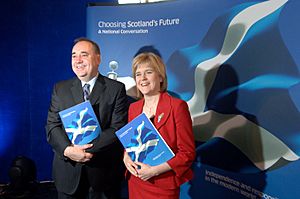
After the 2004 European Parliament elections, the SNP did not do well. This led to pressure on John Swinney to resign. Swinney stepped down on 22 June 2004.
On 15 July 2004, Salmond announced he would run for SNP leader again. This surprised many, as he had said he would not. He won the election with over 75% of the votes. Since he was not an MSP at the time, his deputy, Nicola Sturgeon, led the SNP group in the Scottish Parliament. He was re-elected as an MP in 2005. He planned to return to the Scottish Parliament in 2007 to try and win power.
2007 Scottish Parliament Election
Salmond led the SNP in the 2007 Scottish Parliament election. He ran for the Gordon constituency. He won the seat with 41% of the vote. This brought him back to the Scottish Parliament after six years. In the election, the SNP became the largest party. They won 47 seats, one more than Labour.
The SNP first tried to form a government with the Scottish Liberal Democrats. But the Liberal Democrats refused. This meant the SNP could not form a majority government. The Scottish Green Party then agreed to support an SNP minority government. In return, the Greens received concessions on climate policy. A Green member also chaired a committee.
Alex Salmond as First Minister of Scotland
First Term: 2007–2011
On 16 May 2007, with Green support, Salmond was elected First Minister of Scotland. He officially took office the next day. He became the Keeper of the Great Seal of Scotland. Four weeks later, he joined the British Privy Council. Salmond was the first nationalist politician to be First Minister. He appointed Sturgeon as his Deputy First Minister.
Starting Government Work
Salmond made the Cabinet smaller, from nine members to six. He said his government would decide policies "case by case". To focus on being First Minister, Salmond stepped down as the SNP leader in the UK Parliament. Angus Robertson took his place. In November 2007, The Guardian reported that Salmond believed Scotland would be independent within ten years.
Responding to the Glasgow Airport Attack
Salmond had been First Minister for just over a month when an attack happened. On 30 June 2007, a vehicle crashed into the Glasgow Airport terminal. This was the first terrorist attack in Scotland since the Lockerbie bombing in 1988.
Salmond released a statement in Edinburgh. He called for "vigilance and unity against the forces of terror". He also praised the emergency services. Salmond held a meeting with his government's security advisors. He then joined an emergency meeting with UK Prime Minister Gordon Brown.
Ideas for Scottish Independence
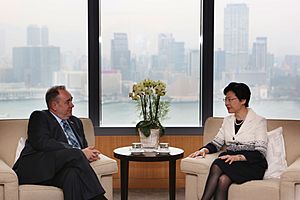
On 30 November 2009, the Scottish Government published a plan for an independence referendum. It offered four choices, from no change to full independence. A draft law for public discussion was released on 25 February 2010. It suggested a two-question referendum: more devolution or full independence. The SNP could not get support from other parties, so they withdrew the plan.
2010 UK General Election Debates
Salmond said it was "unacceptable" for the SNP to be left out of the 2010 UK election televised debates. He wanted broadcasters to include the SNP, as they were the Scottish Government. The SNP used the Freedom of Information Act 2000 to check if the BBC had broken its rules. Salmond said it was wrong to exclude the party leading in Scottish polls.
The SNP tried to legally challenge the BBC's decision. They asked a court to stop the debate from being shown without the SNP. The court dismissed the complaint. The judge said the SNP had waited "far too late" to bring the case. The SNP's opponents called their legal action a "stunt".
There were also Scottish debates about devolved issues. Salmond accepted an invitation to attend those on Sky TV. He declined to attend the BBC and ITV debates. Angus Robertson took his place in those debates.
Focus on Renewable Energy
In his 2010 New Year message, Salmond spoke about sustainable development and renewable energy in Scotland. He said the Scottish Parliament needed more powers. This would help Scotland use its green energy potential.
In December 2009, he campaigned for climate change laws. This was at the 2009 United Nations Climate Change Conference in Copenhagen. He wanted to show Scotland's role in fighting climate change. He signed an agreement with the Maldives, a country at risk from rising sea levels.
Energy policy is mostly decided by the UK Parliament. However, Scotland has some powers over planning. This allowed the Scottish Government to make Scotland a leader in renewable energy.
2011 Scottish Parliament Election
Before the 2011 Scottish election, the SNP promised another independence referendum if they won. The election system was designed to prevent one party from winning a majority. However, the SNP won 69 seats, giving them a majority of four. Salmond was re-elected for Aberdeenshire East.
Second Term: 2011–2014
The SNP's majority meant Salmond would be First Minister again. He was re-elected without opposition on 18 May 2011. This majority also gave him the power to call an independence referendum. On 10 January 2012, the Scottish Government announced the referendum would be in late 2014.
On 7 November 2012, Salmond became the longest-serving First Minister. He passed his predecessor, Jack McConnell.
Independence Referendum
An agreement was signed on 15 October 2012. David Cameron and Salmond signed it. It set out the legal rules for the referendum. On 21 March 2013, the SNP government announced the referendum would be on 18 September 2014. Scotland's Future, a plan for an independent Scotland, was published on 26 November 2013.
Resigning as First Minister
On 19 September 2014, the results of the 2014 Scottish independence referendum were announced. Most Scottish people had voted against independence. Salmond then announced he would resign as First Minister in November 2014. On 15 October, Nicola Sturgeon was the only candidate to run for SNP leadership. She officially became SNP leader on 14 November. Salmond resigned as First Minister on 18 November. Sturgeon was formally chosen as his successor the next day.
My time as leader is nearly over, but for Scotland, the campaign continues and the dream shall never die.
After Being First Minister
Back in the UK Parliament
On 7 December 2014, Salmond announced he would run for MP in Gordon. This was for the 2015 United Kingdom general election. He said he did not plan to become the SNP leader in the House of Commons. His successor, Nicola Sturgeon, reminded voters that she was the party leader.
Salmond won the seat of Gordon. He replaced the Liberal Democrat Malcolm Bruce. On 13 May 2015, Salmond became the SNP's foreign affairs spokesperson in the House of Commons. He said the party would support Europe and developing countries. They would also be "against military adventurism".
He gained media attention for a comment to Business Minister Anna Soubry. He told her, "Behave yourself, woman." Soubry said his attitude belonged "firmly in the 19th century". However, Nicola Sturgeon defended him. She said he was not sexist and it was a "boisterous" debate.
In the 2017 general election, Salmond lost his seat in Gordon. He lost to Colin Clark of the Scottish Conservative Party. This was the first time since 1987 that Salmond was not in an elected position.
Hosting Television Shows
On 9 November 2017, the RT channel announced Salmond would host a show. It was called The Alex Salmond Show. Nicola Sturgeon said she would have advised against his decision. Other Scottish politicians criticised him. His former colleague Tasmina Ahmed-Sheikh also appeared on the show. The first episode aired on 16 November 2017. In February 2022, Salmond announced his show on RT was suspended. This followed the 2022 Russian invasion of Ukraine.
On 11 July 2023, Salmond started a new show. It was called Scotland Speaks with Alex Salmond. It was available on social media. It had a similar style to his previous show. In February 2024, the show returned on the Turkish broadcaster TRT. The first episode featured an interview with actor Brian Cox.
Leading the Alba Party
On 26 March 2021, Salmond announced he had joined the Alba Party. He became its leader. This new party aimed for Scottish independence. He said he did not want to harm Nicola Sturgeon. The party did not win any seats in the 2021 Scottish Parliament election. However, Salmond said the party would continue its work.
Alba had 111 candidates in the 2022 Scottish local elections. None of them won a seat. Salmond later said that all pro-independence parties needed to work together. He said if the proposed 2023 independence referendum did not happen, there would be big political changes in Scotland. He believed Alba would play a strong part in this.
Relationship with the SNP After Sturgeon
- Further information: Premiership of Nicola Sturgeon and Premiership of Humza Yousaf
After Nicola Sturgeon resigned, Salmond commented on the 2023 Scottish National Party leadership election. Salmond supported two candidates who did not win, Kate Forbes and Ash Regan. Regan was seen as close to Salmond's Alba Party. Her campaign was run by a former Salmond staffer. Despite saying she would not join Alba, Regan later moved to the party. She became the first MSP to switch parties directly.
Salmond was critical of Humza Yousaf, who won the leadership election. Yousaf had served as a minister under Salmond. Salmond continued his criticisms after Yousaf became First Minister. He called on Yousaf to change the SNP's direction. He also asked Yousaf to end the power-sharing agreement with the Greens. In 2024, Yousaf expressed sadness about his relationship with Salmond. He said Salmond "now spends a fair bit of his time laying the boot into the SNP and trying to damage me".
Alex Salmond's Personal Life
Salmond married Moira McGlashan in 1981. Moira was a senior civil servant and was 17 years older than him. They did not have children. They kept their private lives very quiet. They lived in a converted mill in Strichen, Aberdeenshire.
Salmond was a member of the Church of Scotland. He considered himself a religious person.
Outside of work, Salmond enjoyed golf, horse racing, football, and reading. He wrote a column about horse racing for Glasgow's Herald newspaper. He supported the Scotland national football team and Heart of Midlothian FC. He also liked Scottish cultural life, watching Star Trek, and listening to country music.
Alex Salmond's Death
Salmond died on 12 October 2024, at age 69. He had given a speech in Ohrid, North Macedonia, earlier that day. He collapsed afterwards. After his death was announced, flags at the Scottish Parliament Building were lowered to half mast. This was done as a sign of respect.
STV News called Salmond "one of the biggest figures in modern Scottish politics". Many tributes were paid to him. Scotland's First Minister, John Swinney, said he was "deeply shocked and saddened". He added that Salmond "made an enormous contribution to political life". UK Prime Minister Keir Starmer said Salmond "leaves behind a lasting legacy". He called him a "monumental figure of Scottish and UK politics".
Nicola Sturgeon, Salmond's successor, said she was "shocked and sorry". She added that their relationship had become difficult in recent years. However, she said, "for many years Alex was an incredibly significant figure in my life. He was my mentor". Other politicians also paid tribute. These included Secretary of State for Scotland, Iain Murray, former SNP MP Joanna Cherry, and former Scottish Conservative leader Douglas Ross.
Awards and Recognitions
Salmond received several honorary degrees. These recognised his political career. He received a doctorate from the University of St Andrews in 2007. He also received a degree from the University of Glasgow in 2015.
In November 2007, Salmond won The Spectator's Parliamentarian of the Year award. This was for his "brilliant campaign" and "extraordinary victory" in the Scottish Parliament elections. This win ended eight years of Labour rule.
|
See also
 In Spanish: Alex Salmond para niños
In Spanish: Alex Salmond para niños
 | Sharif Bey |
 | Hale Woodruff |
 | Richmond Barthé |
 | Purvis Young |


